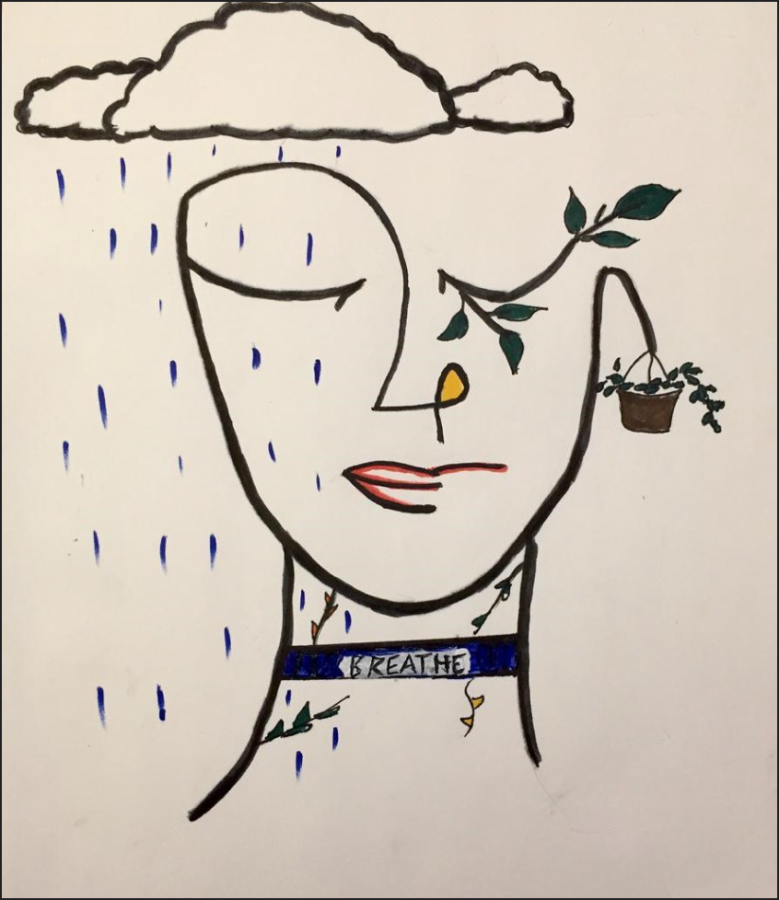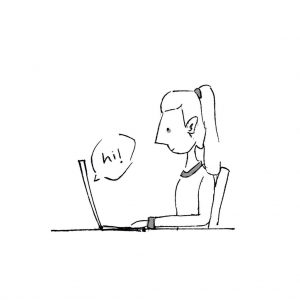You are not alone: an open letter to the DVHS student body
Throughout the struggles and difficult experiences of life, please reach out to those who can support and care for you. It’s okay to ask for help. You are not alone.
December 17, 2020
Dear Wildcats,
I want to preface this by saying that if I offend you in any way or seem disingenuous, I deeply apologize. Perhaps it’s selfish of me to want to write to you, but after recent events and this challenging semester, I feel compelled to.
Typically once a year, I write an op-ed in the Tribune when something strikes a nerve, and I think I can impart some sort of “wisdom” or insight (in quotes because do any of us really know anything?). Last year, I wrote about college acceptance after the Editor-in-Chief was going to explode with anxiety about it. It may have calmed down seven students, but I tried. I also wrote about the struggles of quarantine from a teacher’s perspective, which was a kind of therapy in and of itself.
But this is more of an open letter to you, Dougherty students, because you and your community are hurting, and I think we need to talk about it.
I am not an expert on any of this. I am not a licensed therapist or mental health professional. But, I have been informally counseling high school kids for more than a decade. And I see you, though you may be a small screen or just a set of initials. I see what your faces are saying. I also hear what you’re not saying.
The other day in a class, a student confessed this heartbreaking statement that’s stayed with me since: “We’re just so, so alone.”
What I think this student was NOT saying but also meant underneath the surface was: I am struggling; I am disconnected; I need people, I need support; I am not okay.
As a teacher, a supporter, mentor, human, what I want to say to you is this: you are not alone.
You may be physically alone, in a room on a Zoom call. Or maybe you’re surrounded by members of your household who are currently loud, annoying or just generally driving you crazy, and while you are physically surrounded by people, you’ve never felt more alone.
I think we often perceive that our suffering is a solo, unique struggle. Especially at DV, the public perception is that the “successful student” is one who has it all under control. To ask for help, to show even a twinge of weakness or vulnerability, is to lose: success at all costs, no matter the consequences to mental health.
As a country, a society, as a community, as a school, I think we don’t talk openly enough about how we’re feeling. We ask how you’re doing; we don’t always ask you to name your feelings. Vulnerability and honesty are HARD, and it’s easier to mask and move on.
And when we don’t talk openly, we DON’T create that necessary culture where it’s okay to not be okay, which is what’s needed to truly process grieving, struggles; we also don’t work towards healing, and that’s where we feel stuck and unheard.
I also see your feelings invalidated all too often, consciously or not. I hear statements like “You’ll get over it”; “Just keep going”; “You’re too young to feel that way”;“Stop being ungrateful for all the things you do have”; “I wish I had [x problem] so I could write about it in a college essay”. It conditions us to instead simply say “it’s fine” and drop it. I hate these statements; your feelings are real and valid, and they should be accepted and heard, not dismissed.
I also see that this invalidation leads you to turn to your friends, who are, while well-meaning and empathetic (like, woah; I am continually so impressed by your kindness), are also teenagers dealing with struggles of their own, who unfortunately haven’t been taught how to counsel others, who haven’t been taught how to compartmentalize and create boundaries that prioritize self-care. This can often lead to dismissive or ill-advised feedback, or you feel like you have to take on your friends’ struggles, diminishing your capacity to process yours.
It’s a LOT. We are also trying to mentally and physically survive a global pandemic, seeing some of our deadliest days in American history, all while demanding that you manage challenging classes, apply to college virtually, log in and out of seven different Zoom links and much more. Normal stress is exacerbated by the fact that we don’t have normal life distractions or our physical communities and spaces. We’re just in our bedrooms, or garages, or wherever there’s a tiny bit of peace, staring at little squares or crushed by a never-ending Google Classroom feed. As Fredrik Backman says in “Anxious People”, “It just hurts so much at times, being human.”
Which leads us right back to that student’s comment: “we’re just so, so alone”.
If you’ll indulge me, let me share something very raw and vulnerable: I know how easy it is to feel alone; I know those dark places. You wonder if anyone would really notice if you just stopped sharing your feelings. How long would it take for someone to realize you hadn’t responded to a text or a DM. Where you believe that no one really understands how and why you’re struggling. You wonder how you could feel so alone while surrounded by so many people. You wonder if and when you will ever stop feeling like this.
I also know what it is to be on the other side of that dark place, where it becomes clear that the light that gets you through those dark places are the people in your life and the prioritizing care and attention you give yourself.
And if you get nothing else from this letter Dougherty students, please know this: you are not alone. You do not have to do this alone. You matter. You are enough. You deserve support and help.
Listen: I think it’s okay to not be okay. I think we should talk more about how we’re not okay. I highly encourage you to reach out to people you trust who have perspective and empathy. Share in your struggles with your friends. Reach out to teachers, counselors, the Wellness Center, mental health professionals, who have spent years focused on and learning how to not only help others but also enduring and managing hard times and struggles themselves.
We — teachers, counselors, staff — may seem scary. We kind of have to scare you into completing work, but as humans there is nothing more that we care about than your well-being and your health and safety. It is not okay to cheat on your assignments, sleep in every class and stop trying. It is MORE than okay to ask us for help and support.
Feelings and emotions are okay. Crying is a healthy emotional coping mechanism; it’s actually an evolved human trait. You are also not burdening someone by sharing that you’re struggling; you are allowing yourself the opportunity to process your feelings and someone else the opportunity to help and support someone they care about, which is what humans are kinda conditioned to do.
What becomes scary is when we get stuck in a feeling, what I refer to as the “rabbit hole”. A great suggestion I have now come to live by is to consider the duality of my brain: the emotional side and the rational side (this does not mean emotions are not rational or valid, it means they are two distinct concepts). We often first go to the emotional side of the brain and spend some time there (that’s okay), but to actually process and move forward, we must then move to the rational side. Thus: “No one cares about me” is a very valid, painful feeling. We go there when we’re feeling misunderstood and alone. But to help ourselves, we can think: “I’m feeling right now like no one cares about me, but if I think about it, my sister and my friend X actually do, and maybe I should text them, because I know they’ll remind me people do care about me”.
The opposite is also scary: when we never talk about or process feelings, instead suppressing or ignoring them. This seems like the easier option: “if I don’t talk about it, it’s not real, it’s not bothering me”. But, like a box, there’s only so much we can stuff in there before it won’t close, bursting at the seams. So while you don’t have to share anything you don’t want to, never talking about any feelings is a dangerous place for our overall mental health. I encourage you to find at least one person you trust that you can talk openly with, without fear of judgment, comparison, scorn.
In this pandemic, I will tell you that it’s become very easy for me to retreat into my feelings, turn on Netflix, not think, becoming unconsciously swallowed in my sadness. But like that overflowing box, the emotions are always finding ways to arrest me, often late at night. I suddenly find my chest is tight, my breath shorter, and things seem blurry and hazy. That’s when I know I need to reach out, to the people in my inner circle I trust and who I know will unconditionally care to respond and listen. I have learned that talking about my struggles doesn’t make me weak; it makes me REAL. It makes me human. It makes things better.
I also offer you a few unsolicited suggestions in helping yourself in these dark moments and scary places, as per a suggestion from one of my beloved Tribune reporters:
- Take time every day to do something that feeds your soul. One year in a particularly dark time, I made a list of every single thing or activity that I enjoyed or brought me happiness. It was random and ridiculous (“wandering aimlessly through Target” was one and damn do I miss that right now) but it was so stupidly helpful. After a while, those things became internalized, my brain automatically deciding to do one when I felt down. I know there are already not enough hours in the day to complete your massive task lists, but taking time for ourselves (however short or long a timeframe) is what sustains us, what keeps us healthy.
- Conversely, let go of things that do NOT feed your soul. I realize you have no choice but to endure timed writes (sorry AP Lit Per 4 fam) and WebAssigns, but life is too short to continue doing things that make you unhappy. UNPOPULAR OPINION: taking that extra AP course will not get you into college but it might make you lose several hours of sleep each night, ultimately causing you physical and mental turmoil. As we grow, we change, and sometimes things we used to love don’t serve us anymore, and it’s okay to let go of them. It’s also okay to say no more and yes to fewer people. Taking care of you is priority number one.
- Writing, either unsent letters (to someone in particular or to no one), or just random thoughts, helps process and identify feelings we didn’t know we had. Some of my students write post-its with good thoughts and reminders and stick them on their walls. Others journal. Do what feels good to you.
- Go outside. The sole sensory experience of nature has actual scientific theory behind it. Exercising (of any kind; I am a fan of the dance party or boxing) keeps your body AND your brain healthy too. I abide by the somewhat Transcendentalist tenet that the sky and big trees remind us what it means to be alive, and my (mostly) daily outdoor time has been instrumental in managing this year.
- Don’t knock the breathing, meditation, Calm apps etc. The key is to do these things when you’re NOT upset, instead when you’re calm, so that when you later do feel X emotion, your body instinctively knows how to help you (this idea courtesy of Wellness Center Social Worker Ms. Rodriguez, who is amazing, if you haven’t talked to her yet). Take breaks throughout the day and find one that feels natural to you (I like the counting breaths or noticing things techniques).
- Find your community, wherever or whomever that is. Decide on a few people–at least one of them a trusted adult–you know you can reach out to and talk about how you’re feeling. Then, actually tell them.
I don’t have this all figured out. I still have some pretty unbearable days. And there are far more experts who could weigh in here, but mostly I want to repeat this to you: you are not alone.
2020 is almost over, and 2021 will be better in some ways but still challenging in others, so let’s resolve NOT to worry about weight loss, flossing (ok, well, maybe floss, my dentist wouldn’t like that) or learning how to bake bread. Let’s instead resolve to have conversations in this community about how we can create spaces for open, honest talk, where we validate instead of demean, where we acknowledge, not squash, where we normalize struggle instead of punishing it, where we speak our truth. The more we talk about our struggles, the more we realize how connected we are, how we are all struggling but struggling together. As my celebrity BFF Sara Bareilles says, “Salvation is coming in the morning, but now what we need/is a little rain on our face from you, sweet Saint Honesty.”
With support & love,
Ms. Decker
If you or someone you know is struggling, there are so many people and support systems you can reach out to, 24-7 and anonymously. Here are just a few:
- DVHS Wellness Center
- Contra Costa Crisis Center Crisis & Suicide: 800-833-2900 or text HOPE to 2012; Grief: 800-837-1818; Homeless: 800-808-6444
- Chat online at the National Suicide Prevention Lifeline or call 1.800.273.8255
- Crisis Text Line: TEXT “START” to 741-741
- The Trevor Project (LGBQT crisis intervention and suicide prevention hotline): 1.866.488.7386




Mitali Mittal • Jan 13, 2021 at 7:21 pm
Thank you so much for this! I definitely needed that reminder to take a break sometimes because I keep telling myself to push through it. I really appreciate everything you have done for us Ms. Decker!
Amy Starling • Jan 12, 2021 at 9:29 pm
I needed to hear this today. Thank you. Quarantine has been such a dark time for me personally, as I feel like so many of my core identities are failing and dying because of it. If I’m not getting to meet new people and talk to classmates, I start to feel isolated. When I can’t focus at all and find myself unable to work on zoom meetings, my grades start to slip and I just feel depressed because I’d never gotten such a low GPA before. I’ve been stuck alone, hearing about all the bad things happening on the news, and honestly I just don’t know if it will be okay anymore. So thank you for writing this article. Thank you for reassuring me that no matter how dark things are, it will get better.
Azine Davoudzadeh • Jan 4, 2021 at 8:17 am
Thanks Rachel, your honesty is refreshing and resonating. I’m sure this article has already helped many students & staff. 🙂
Alina Mohammadian • Dec 18, 2020 at 2:43 pm
Thank you Ms. Decker for opening up and being honest about you’re own mental health. Sometimes it’s nice to know that even teachers need a little help. Shows us that we’re all human after all. We’re all in this together <3
Daniel Bowen • Dec 18, 2020 at 9:36 am
Great stuff Rachel! Such an important truth for our kids to hear.
Contra Costa Crisis Center • Dec 18, 2020 at 7:59 am
Thank you so much, Rachel, for writing what so many are feeling and so many may need to hear.
You are not alone. No one need face this alone.
Our supportive, caring, expert phone specialists are available 24/7/365 via text or phone, as mentioned in the resource list at the bottom.
Many, many people call just to talk. We want to hear from you!
Please stay safe, and take that first step to reach out. Let someone else know how you are feeling.
We can also help you with how to start a conversation with someone you are concerned for and just don’t know what to say.
Stay safe out there! There is light at the end of the tunnel, let’s help each other get all the way through.